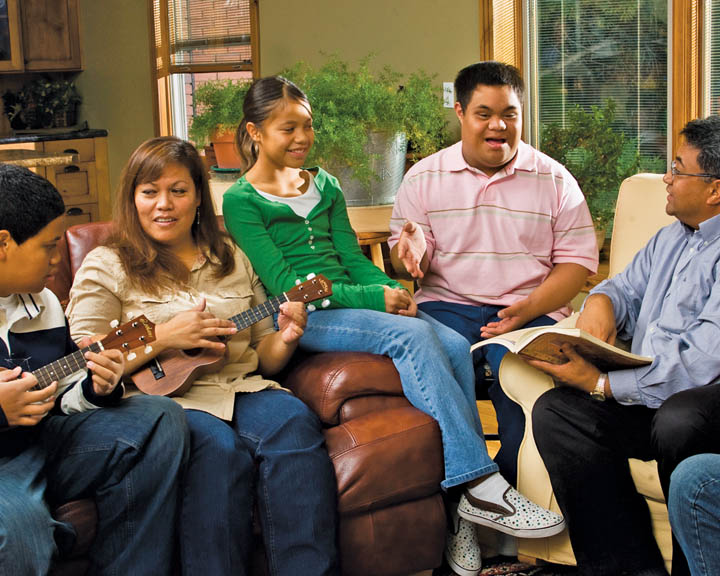For some parents it may seem like the most difficult thing in the world to do at time: love your teenager. The angelic little boy who used to love giving out hugs and kisses now flinches away from any signs of affection. The precious little girl who would heartily proclaim, “I love you,” now says hardly a word at all.
C. Ross Clement, a licensed clinical worker for LDS Family Services, stated:
“As parents, the single most important thing we can do for our children is to love them as the Savior loves each one of us (see John 13:34–35). When our children know that we truly love them, they are more likely to listen to our counsel, follow our example, and accept our discipline” (C. Ross Clement, “Talking with Teens,” Ensign, Jun 2005).
There is a trick not only in learning to love your teen, but more importantly in learning to speak your teens language of love.
A few years ago I was turned onto a series of books that opened my eyes as to how people both accept and give love. At the time I was a leader in the Young Women (girls age 12-17) program in my ward (large congregation in the Church of Jesus Christ of Latter-day Saints, nicknamed Mormon Church). I was so inspired by what I read that I invited both the girls as well as their mothers to attend a presentation I put together. My goal for that activity: to help parents and teens realize why their relationship is so strong, or so weak, when it comes to loving their teens.
Before we explore the way teenagers give and express love, we need to take a moment to look at how we love our children. Until about the age of five, all children receive love through five different channels: positive words, acts of service, positive physical touch, gifts, and quality time. These five areas were explored by Gary Chapman, Ph.D, a marriage and family counselor. He discovered that after the age of five, children begin to select one or two areas where they in particular are able to connect with someone when it comes to love.
Some children may appreciate quality time with a parent much more than being given a gift. That time spent together speaks of love in more ways than a trinket ever could. Other children may respond overwhelmingly to positive, uplifting, and loving words far more than being given a hug or pat on the back. We’ll explore these areas more in the next few posts.
For several years children will lap up any bit of love in their specific area, and will blossom greatly under the influence. Then something big happens: they begin the transition into becoming a teenager. No longer do they want hugs and kisses, outright declarations of love, seemingly corny trinkets, or going to the grocery store just so you can be together.
Teens naturally begin to pull away from their parents. Sister Julie B. Beck, former 1st counselor in the General Young Women program of the Church of Jesus Christ of Latter-day Saints, tells us why:
“They’re in a searching age—it’s the “why” age. There’s a reason for that: the Lord wants them to get their own testimonies” (Young Women General Presidency, “For the Strength of You,” Ensign, Oct 2007).
While they are in this process of searching for the why and what of everything in life it is more important than ever for them to feel secure in their love at home.
As teens move away from their childlike selves, their particular love language doesn’t change to something new, it merely looks for a new avenue. Dr. Chapman tells us that teens pull away from being loved as they were as a child, for they no longer wish to feel like a child. They are beginning their journey into forming adult personalities, and therefore wish to be loved in a more adult manner.
Think about that for a moment. Would you, as an adult, want to be sat down on your parents’ lap and cooed at, have your cheeks pinched, or your hair mussed up? Would you honestly appreciate having your mom or dad come over and do your laundry, clean your house, do your taxes, cook your meals, and balance your checkbook? Okay, okay, maybe that doesn’t sound like such a bad think, lol. For most of us, however, it’s a sign of independence to be out on our own and able to do these things for ourselves.
Teens are beginning their own journey in becoming the person you now are. In much the same way they desire to be loved in a more adult fashion.
Over the next few posts I hope to help you come a little closer to your teens. Keep in mind if you don’t speak the same language of love it will take time and a lot of effort to make a change in your relationship. The perception of your actions with your teen could have been warped before now, because your teen didn’t see the love behind the actions.
“Without love, a parent’s expression of disappointment can be perceived as rejection and, oft repeated, can damage the child’s sense of worth. Teaching without love may fail to touch the hearts and lives of our children. Listening without love may be perceived as disinterest. Discipline without love will be looked upon as unrighteous dominion” (C. Ross Clement, “Talking with Teens,” Ensign, Jun 2005).
We all speak a particular language when it comes to love. If we desire to see our teens become strong and confident, we must learn to speak their particular love language.
“Love should be the governing force in all of our interactions with our children” (C. Ross Clement, “Talking with Teens,” Ensign, Jun 2005).


